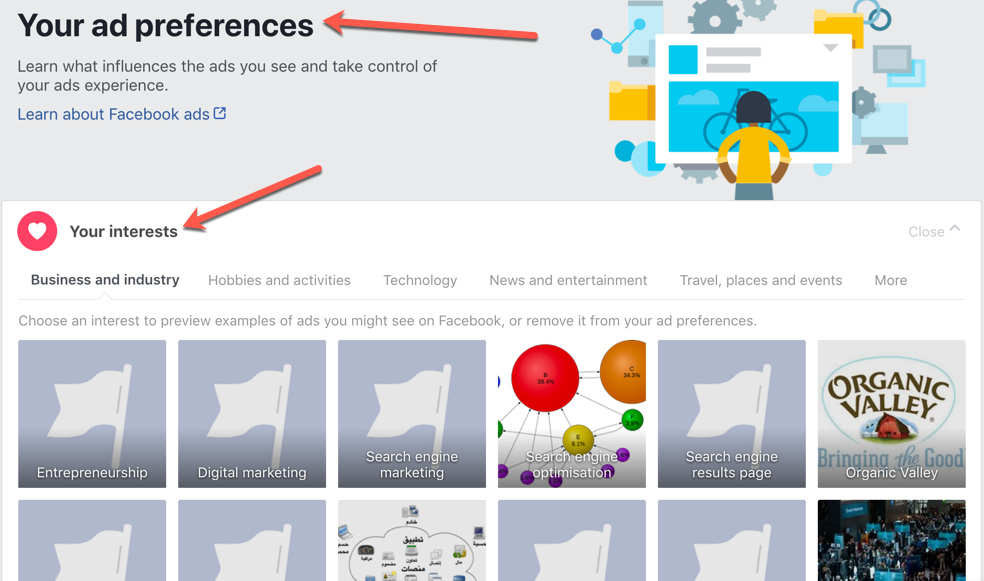Last Fall, the Pew Research Center asked 942 adults in the U.S. to log in to their Facebook page and navigate to the page containing their Facebook ad categories.
This is a section in their Facebook account that lists categories Facebook believes the user is interested in, based on their behavior and traits on Facebook.
The results were compiled in a recently released study, Facebook Algorithms and Personal Data.
Most digital marketers understand their online behavior is collected and categorized for ad targeting. However, most typical users may not know this, and they can easily access the collected profile information on Facebook on “Your ad preferences” page.
In the Pew study, 74 percent of Facebook users say they did not know that this list of their traits and interests existed until they were directed to their page as part of this study.
The results of the Pew research study may surprise some advertisers who rely on this type of algorithm-driven system to define their audience that they ultimately invest ad spend into to grow their businesses.
While the majority of 59 percent lean toward users feeling the Facebook-defined categories are close, 27 percent do not think the information is accurate:
“When asked how accurately they feel the list represents them and their interests, 59 percent of Facebook users say the list very (13 percent) or somewhat (46 percent) accurately reflects their interests. Meanwhile, 27 percent of Facebook users say the list not very (22 percent) or not at all accurately (5 percent) represents them.”
To get more insight, we reached out to Lee Rainie, Director of Internet and Technology Research, who co-authored the study with Paul Hitlin at the Pew Research Center.
Why is this research important?
Lee Rainie (LR): We did this research to explore a central aspect of the web/app ecosystem related to data collection and ad targeting.
Most commercial sites, from social media platforms to news outlets to online retailers, collect a wide variety of data about their users’ behaviors.
Companies and organizations use this data to deliver content and recommendations based on users’ interests and traits, and to allow advertisers to target ads to relatively precise segments of the public.
The issues we tried to explore in the context of Facebook are:
- How well do Americans understand these algorithm-driven classification systems?
- How much do they think their lives lineup with what gets reported about them?
Does the data reflect trust issue between Facebook/advertisers and users?
LR: We actually did not ask about trust. Our central questions focused on:
- What did the respondent in our survey see when they looked at their ad-preferences page?
- Did they know Facebook maintained information listing their interests and traits?
- How comfortable were Facebook users with the platform compiling this information?
- And how accurately did they think those listings represented them?
Clearly, a notable share of Facebook users didn’t know about these practices and about half were not comfortable with Facebook compiling the information – which of course, means that half were at least somewhat comfortable with the compilation of those lists.
We don’t often ask in our polls why people don’t know things or don’t use things, so we don’t have any insights specifically about why people didn’t know Facebook collected and displayed some material about them.
We have found over the years in our array of privacy research that Americans often aren’t aware or are confused about what is happening with their data: how it’s collected, how it’s used, what third parties might have access to it. These findings certainly fit with that broad pattern.
What are the key takeaways for advertisers?
LR: One main takeaway is that despite efforts by online entities to explain how they collect and use data there is still a share of the population that isn’t aware of that and a share that isn’t comfortable with that.
Another interesting insight in our data is that the more accurate users thought a portrait of them was, the more likely they were to feel comfortable with the profiling process.
Are there any questions you wish you would have included?
LR: This is any researcher’s pain point. There are always more questions to ask and more context to understand, especially on issues like this.
A major finding of ours in a different survey was that the context of personal data sharing is enormously important.
Their decisions about sharing personal information depend on the individual, their circumstances at the moment, nature of the bargain being offered, the nature of the risk in sharing and several other things.
My favorite passage from that report:
“These findings suggest that the phrase that best captures Americans’ views on the choice between privacy vs. disclosure of personal information is, ‘It depends.’ People’s views on the key tradeoff of the modern, digital economy – namely, that consumers offer information about themselves in exchange for something of value – are shaped by both the conditions of the deal and the circumstances of their lives.”
So, the list of questions that interest us is as long as our imaginations. People have rich, complicated, multi-layered lives and there is always more to learn about their circumstances and their thinking.
Final Thoughts
As a result of this research, advertisers are now armed with a deeper level of understanding of their audiences’ knowledge of personal data that is collected about them.
Considering almost a third in the survey believed the categories didn’t represent them well, how can advertisers use this to target and optimize ad campaigns on Facebook in the future?
More Resources:
- 4 Awesome Features That Can Improve Your Facebook Ads
- 5 Reasons Your Facebook Ads Aren’t Converting & How to Improve Them
- The 3 Facebook Ad Metrics You Aren’t Looking At, But Should Be
Image Credits
Screenshot taken by author, January 2019



